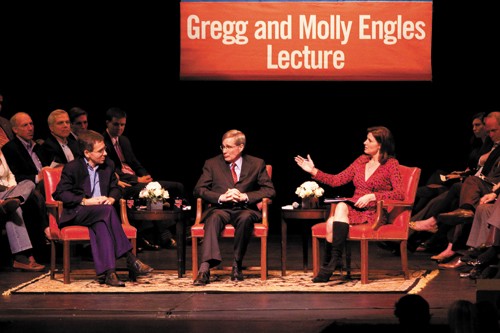
(MICHAEL DANSER/The Daily Campus)
Over the past 40+ years, SMU has strived to promote an understanding of Russian culture, from offering unique Russian language courses to implementing the SMU-in-Moscow study abroad program.
Awareness of U.S.-Russian relations came to a pinnacle Tuesday evening when two experts spoke about Russia in the 21st century in the McFarlin Auditorium.
Brad Cheves, vice president of Development and External Affairs, began the Willis M. Tate Distinguished Lecture Series promptly at 8 p.m. by recognizing the presidential scholars within the sophomore undergraduate class and then turned the floor over to SMU President R. Gerald Turner.
“U.S. states face challenges around the world; prominent among them is our relationship with Russia,” Turner said. “Tonight we will benefit from the insight of these leaders as they discuss Russia in the post-soviet world.”
Claire Shipman, ABC News senior national correspondent and former member of CNN’s Moscow bureau, moderated the conversation between guest speakers Ian Bremmer and Stephen Hadley.
Bremmer is the president of Eurasia Group, a global risk research and consulting firm, and the youngest-ever national fellow at the Hoover Institution. He currently teaches at Columbia University.
Hadley served as National Security Advisor under President George W. Bush from 2005-2009, the principal White House foreign policy advisor, and director of the National Security Council staff.
One of the overarching questions of the discussion was summarized within Shipman’s first inquiry.
“The state of U.S.-Russian relations remains a constant puzzle,” said Shipman. Now that President Obama is working to regain these relations, “What does this reset mean? Is it possible? How do you see this working so far?”
Hadley relates Obama’s intention to “reset” or regain Russian foreign relations to previous efforts made under both the Bush and Clinton administrations; who “share a romantic view of the relationship between the countries.”
Identifying common areas as well as areas of differentiation, and also maintaining cooperation are ways in which Hadley said he believes this international relationship can gain strength.
Bremmer, believes there is a lack of progress in forming a strong relationship with Russia.
“Obama has very little bandwidth to focus on administration and Russia,” Bremmer said.
Part of the reason for the strenuous ties between U.S. and Russia is that Russia stumbled economically and politically after the Cold War in finding a system of government that worked best for them, according to Hadley.
He said new superpowers have emerged over the past 20+ years and we have found that authoritarian regimes will not longer work. The 21st century is different, and Russia needs to democratize and modernize to compete.
Despite Russia’s internal problems, Russian Prime Minister, Vladimir Putin, has a powerful pull in political issues around the world.
“There is no one in the world who runs a country anywhere near this size;” who has the capacity to do it the way he does, said Bremmer.
Regardless of the political tug-of-wars associated with forming a new relationship, both Bremmer and Hadley agree that the U.S. should make an effort in other areas, such as science, to work collaboratively with the Russians.
“Ultimately, the U.S. can afford to be generous,” Bremmer said. “We have economic, military and diplomatic experience to work with in [forming] a relationship with Russia.”
The Tate Lecture Series now in its 28th year brings “leading minds from around the world” to Dallas to share their distinct perspectives with the community at large, according to the Tate Lecture Web site. The lecture series awards the University, chiefly Presidential Scholars Program, close to $1 million every year.








